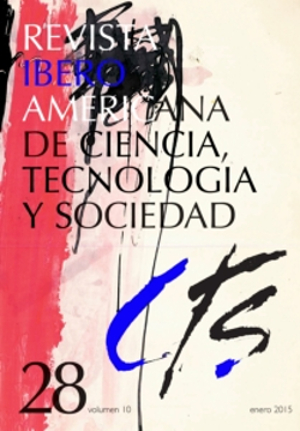Philosophical challenges of science policy
DOI:
https://doi.org/10.52712/issn.1850-0013-565Keywords:
philosophy of science, science policy, Mario BungeAbstract
Science is an important part of the cultural subsystem of most advanced societies. And it is not alone: it interacts with the rest of the culture, the economy and politics. In the field of science policy, there are many conceptual problems that philosophers do not usually pay much attention to. This paper analyses some of these challenges, such as the relationship between political power and science, the justification of social support to basic research or the characterization of content relevance and originality of the results of scientific research. In order to achieve this study, the conceptual framework of the philosophy of science of Mario Bunge and his theory of scientific realism are used.
Downloads
References
BERNAL, J. D. (1939): The Social Function of Science?: What Science Does, What Sciencie Could Do, Londres, Routledge.
BROAD, W. J. (1981): “The Publishing Game: Getting More for Less.” Science, vol. 211, nº 4487, pp. 1137–39.
BUNGE, M. (1983a): “Epistemology and Methodology I: Exploring the World”, Treatise on Basic Philosophy, vol. 5, Dordrecht, D. Reidel Publishing Company.
BUNGE, M. (1983b): “Epistemology and Methodology II: Understanding the World”, vol. 6, Treatise on Basic Philosophy, Dordrecht, D. Reidel Publishing Company.
BUNGE, M. (2001): “Scientific Realism”, en M. Mahner: Selected Essays by Mario Bunge, Amherst (NY), Prometheus Books.
BUNGE, M. (2013): La ciencia, su método y su filosofía, Pamplona, Laetoli.
BUNGE, M. (2014): Ciencia, técnica y desarrollo, Pamplona, Laetoli.
BUNGE, M. y LÓPEZ BORGOÑOZ, A. (2010): Las pseudociencias ¡Vaya timo!, Laetoli.
COMISIÓN EUROPEA (1995): Green Paper on Innovation. Disponible en: http://europa.eu/documents/comm/green_papers/pdf/com95_688_en.pdf.
COOPER, L. N. (2007): “The Unpaid Debt”, Nature Physics, vol. 3, pp. 824–825.
DENEGRI, G. (2014): Ensayos en homenaje a Mario Bunge en su 95o aniversario, Buenos aires, Eudeba.
DE SOLLA PRICE, D. J. (1986): Little Science, Big Science... and beyond, Nueva York, Columbia University Press.
FREEMAN, Ch. y SOETE, L. (1997): The Economics of Industrial Innovation, Psychology Press.
FUNTOWICZ, S. y RAVETZ, J. (1996): “La Ciencia posnormal: la ciencia en el contexto de la complejidad”, Ecología política, vol. 12 (1996), pp. 7–8.
GIBBONS, M.; LIMOGES, C.; NOWOTNY, H.; SCHWARTZMAN, S.; SCOTT, P. y TROW, M. (1997): “La nueva producción del conocimiento”, La dinámica de la ciencia y la investigación en las sociedades contemporáneas, Barcelona, Pomares.
JIMÉNEZ-BUEDO, M. y RAMOS VIELBA, I. (2009): “¿Más allá de la ciencia académica? Modo 2, ciencia posnormal y ciencia posacadémica”, Arbor, vol. 185, nº 738. Disponible en: http://arbor.revistas.csic.es/index.php/arbor/article/view/326/327.
MALTRÁS, B. (1996a): “Los indicadores bibliométricos en el estudio de la ciencia: fundamentos conceptuales y aplicación en política científica: tesis doctoral”, Universidad de Salamanca.
MALTRÁS, B. (1996b): “Concepciones de La Calidad Científica Y Sus Posibilidades de Medida Cuantitativa”, en A. Estany y D. Quesada: Actas del II Congreso de la Sociedad de Lógica, Metodología y Filosofía de la Ciencia en España, Bellaterra, Sociedad de Lógica y Filosofía de la Ciencia, pp. 260–63.
MALTRÁS, B. (2003): Los indicadores bibliométricos. Fundamentos y aplicación al análisis de la ciencia, Gijón, Trea.
MALTRAS, B.; VEGA, J. y QUINTANILLA, M. Á. (1995): “Measuring Multinational Cooperation in Science & Technology: Different Methods Applied to the European Framework Programs”, International Society for Scientometrics and Informetrics. International Conference, pp. 303–312.
MERTON, R. K. y STORER, N. W. (1977): La Sociología de la ciencia: investigaciones teóricas y empíricas, Alianza Editorial.
OCDE (1993): “Propuesta de norma práctica para encuestas de investigación y desarrollo experimental”, Manual de Frascati, París.
OTERO, M. H. (1995): “La racionalidad disuelta en la explicación sociológica del conocimiento: de Fleck a Latour”, en L. Olivé: Racionalidad Epistémica, vol. 9, pp. 245–265.
PÉREZ RANSANZ, A. R. (1995): “Racionalidad y desarrollo científico”, en L. Olivé: Racionalidad Epistémica, vol. 9: pp. 171–201.
QUINTANILLA FISAC. M. Á. (2012): “El pensamiento científico y la ideología de izquierdas”, Página Abierta.
QUINTANILLA FISAC. M. Á. y MALTRÁS, B. (1992): “The structure of scientific production in spain (1981-1989) and the priorities of the national-plan”, Arbor, vol. 141, pp. 107–130.
SÁNCHEZ RON, J. M. (2009): Ciencia, política y poder: Napoleón, Hitler, Stalin y
Eisenhower. Madrid, Fundación BBVA.
SNOW, C. P. (2013): Science and Government, Massachusetts, Harvard University Press.
WEINBERG, A. M. (1961): “Impact of Large-Scale Science on the United States”, Science.
ZIMAN, J. (2003): “Ciencia y sociedad civil”, Isegoría, nº 28. Disponible en: http://isegoria.revistas.csic.es/index.php/isegoria/article/view/503/503.
Downloads
Published
How to Cite
Issue
Section
License
Copyright (c) 2024 CC Attribution 4.0

This work is licensed under a Creative Commons Attribution 4.0 International License.
All CTS's issues and academic articles are under a CC-BY license.
Since 2007, CTS has provided open and free access to all its contents, including the complete archive of its quarterly edition and the different products presented in its electronic platform. This decision is based on the belief that offering free access to published materials helps to build a greater and better exchange of knowledge.
In turn, for the quarterly edition, CTS allows institutional and thematic repositories, as well as personal web pages, to self-archive articles in their post-print or editorial version, immediately after the publication of the final version of each issue and under the condition that a link to the original source will be incorporated into the self-archive.











